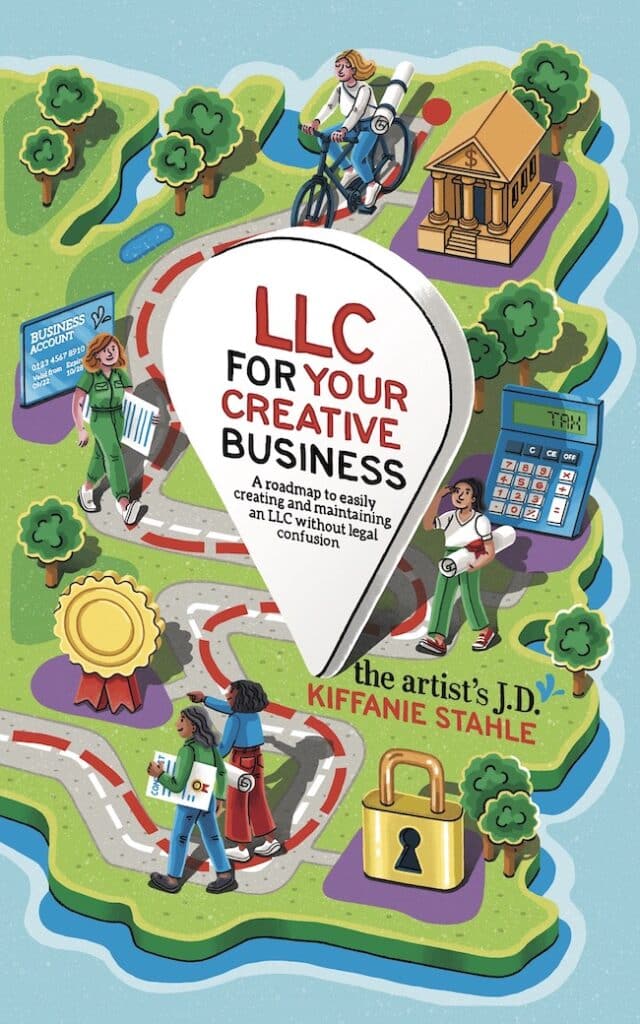Are you struggling to decide if your creative business should become an s corp?
Maybe you’ve been down the Internet rabbit hole more than once and left more confused than when you started.
Don’t worry! You’re not alone.
I often see creatives misunderstanding what an s corp is, what it does for your creative business, and who should advise you to become one.
There is a lot of confusion around this topic, which is why I want to break down:
- what an s corp is (and isn’t)
- how to decide if your creative business should be one
4 legal business types
When it comes to legal business types you have four major choices:
- sole proprietorship
- partnership
- limited liability company (LLC)
- corporation
As soon as you offer products or services, you automatically become a sole proprietorship or a partnership. (The first is if you are on your own, and the second is if you are running your business with one or more friends.)
But like Michael Scott learned you can’t just say, “I declare bankruptcy!” to declare bankruptcy in The Office. You can’t just say, “I declare an LLC!” and become an LLC. (Or a corporation.)
You have to take proactive action. You must let your state know that you want to be one and follow the required steps.
The reason businesses choose to file this paperwork (and comply with the additional ongoing legal red tape) is that being an LLC or corporation puts a fence between your business and personal lives.
So that if something goes wrong in your business, those things in your personal life, your home, your savings accounts, your stock, if you live in a community property state your spouse’s income, all of those things are off the table.
Why an LLC is probably better than a corporation
For the vast majority of creative businesses, an LLC is better than a corporation.
And that’s because:
- it will give you just as strong as a fence
- there are fewer ongoing legal requirements
- you aren’t raising money via venture capital
But often I see creative business owners make the mistake of creating a corporation, because their accountant, tax professional, or someone else advised that they become an s corp.
Want to know if you are ready to go from sole proprietorship/partnership to LLC? Then check out this in-depth guide on if you should be an LLC.
What is an s corporation?
Above, I only listed four types: sole proprietorship, partnership, LLC, and corporation. I didn’t list s corp.
So you might be thinking, “What about an s corp? What is an s corporation?“
The reason I didn’t list it is because an s corp is an IRS-only designation. There is no way for you to go to your state and form an s corp. If you try to do that, they’re going to tell you, “Here’s the corporation paperwork.“
Can an LLC be an s corp?
You don’t have to form a corporation to get the s corp taxation benefits. Both LLCs and corporations can tell the IRS that they want to be taxed as an s corp.
s corp is not a legal designation.
It’s not a way you “create” your business.
It’s only a way to possibly reduce your tax bill come April each year.
An s corp reduces your tax bill by allowing you to become an employee of your business. This is why business owners tell the IRS to treat them this way.
When you have employees, you as the business owner pay a portion of their taxes. This comes from your accounts and never shows up on their paycheck. But of course, the employee also has money taken out of their paycheck for taxes.
At a certain income point, when you add the two of those together you’ll pay less in taxes than you would pay in self-employment taxes. For example, you as the employer pay $5. You as the employee pay $5. Which means you pay a total of $10. But if you paid at the self-employment tax rate you would have paid $15.
But since this is a tax “loophole” that could easily be taken advantage of s corps have additional legal requirements and expectations.
s corp cons
As I mentioned above s corp election is a tax “loophole”. So while an s corp election has the pro of saving money on your taxes, some cons go along with it.
The first con is you’re required to pay yourself via payroll. In a state like California, you’re required to pay yourself twice a month via payroll. You can’t just pay yourself once a month. You have to pay yourself twice a month. So twice a month, even if you’re the only employee of the LLC, you must run payroll. Some payroll service providers make this incredibly easy, but it still has to be done. (When I was an s corp, I used our partner Gusto to run payroll and if you use this Gusto link to sign up, we’ll both get Visa gift cards. < Affiliate link)
Another big con is that you are required to pay yourself a reasonable salary. A reasonable salary is based on:
- where you live
- what similar job roles are paid
If you went out and got a job and would be paid $60,000 a year, you have to pay yourself $60,000 a year. Failure to pay yourself $60,000 a year can result in the cancellation of your s corp status and the IRS will prevent you from ever making an s corp election again.
So while your business doesn’t have to be financially self-sufficient to be an LLC, it does have to be financially self-sufficient to make an s corp election. If you’re clearing $100,000 a year and a reasonable salary is $60,000 a year, then it makes a lot of sense to pay yourself $60,000 a year as a W-2 employee and take the rest as profits of the business. But if you aren’t making $60,000 a year, then you aren’t ready to even ask your accountant if it’s time to elect to become an s corp.
The final con is that the tax return that goes along with an s corp election is complicated. It’s not a simple, straightforward do-it-through TurboTax kind of thing. You’re going to need a tax professional to prepare it. And it will increase their fee to prepare your taxes.
Making this election makes sense for some businesses at a certain point, but it doesn’t make sense for everyone.
Sometimes the tax savings aren’t worth it.
- It’s not worth the added return.
- It’s not worth running payroll.
- It’s not worth the added expenses.
Your accountant is the key
Because an s corp is a tax status and not a legal one, the only person who can tell you that this will save you money is your accountant.
You should go to your accountant and say, “Am I going to save money on my taxes by making an s corp election?” So if they say, “No,” you’re not going to do it.
If they do say yes, then you’ll want to weigh the added costs of being an LLC taxed as an s corp against your tax savings. Because the sole benefit of this election is tax savings.
s corp filing windows
The good news is you don’t have a one-and-done window to make this election. You have two months and 15 days from when you create your LLC to file the s corp form with the IRS, and then you have two months and 15 days at the beginning of every calendar year to also file it. (Yes, your accountant may have ways to get around this window, but it’s easiest when you file within these windows.)
So maybe it doesn’t make sense when you first create your LLC to become an s corp, but two years from now, it does make sense. So each year you’ll have the option of switching your LLC’s tax status if it’s going to save you money.
How to start an s corp
Ultimately, your accountant is the only person who can tell you that making the s corp election will save you money. They will determine this by running the numbers both ways and seeing which way you would pay less to the IRS.
It can be overwhelming to know exactly what’s expected to keep your LLC on the legal up and up

Creating an LLC isn’t:
- as simple as shipping off a form
- a set-it-and-forget-it thing
- a magic bullet to prevent all liability
This book is designed to guide you step by step through the process of making sure your LLC fence remains strong–especially when you need it most.
(If you use the above Amazon affiliate link, we’ll make a small commission, but it doesn’t change the price you pay.)

Hi! I’m Kiff! I’m your friendly legal eagle (and licensed attorney).
My goal is to add ease to the legalese. And because I think basic legal resources should be available to every creative, I create a lot of free content.
If I’ve created something that has helped inject a little ease into your creative business and you would like to say “thank you”, you can make a contribution here.
If you’d like to hear more from me, I’d love to pop into your inbox every Friday morning to share additional ways to cut through the red tape and inject a little ease.
Get tips from your friendly legal eagle in your inbox…
Your privacy is important to us. Learn how we protect it here.

